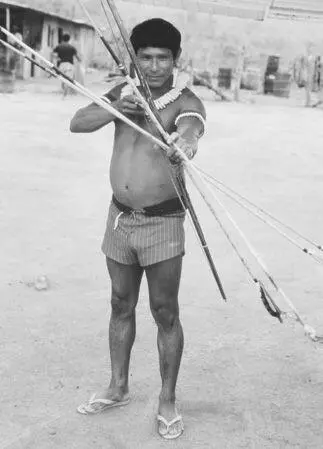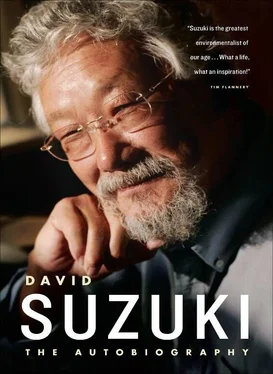It was early evening and we were relaxing in a hut in the village when Paiakan came by. He was husky, of medium height, with Prince Valiant — style, jet-black hair. He was controlled when he met us — not suspicious, but curious. Who were we and what did we want? All of our conversation had to be funneled through Juneia in Portuguese, the official language of Brazil, which Paiakan had acquired as a teenager and now spoke fluently. Juneia introduced him to all of us, but when he looked at me and heard my name, David, his face brightened in a broad smile. Perhaps he was showing respect because I was the host of the program? I learned later there was a more compelling reason.
While a teenager living at a Catholic mission, Paiakan was befriended by a Brazilian Japanese medical doctor named David, or “Davi” in Portuguese. This doctor went out of his way to help the Kaiapo and became a trusted friend. Paiakan said that encountering a second “Japanese” with the same name as his early mentor and friend seemed auspicious and more than coincidental. The Brazilian David had exhibited a great affection for the Kaiapo Indians; because of him, Paiakan trusted me. I have always felt grateful to Dr. David for making my entry into Paiakan's life so straightforward.
Juneia told us Paiakan's story, and it was remarkable. Paiakan's father, Chikiri, is a chief. For his first fourteen years, Paiakan had lived a totally traditional life, as his ancestors had done for thousands of years, hunting and gathering according to knowledge acquired and passed on for many generations.
But even the immensity of the Amazon rain forest was not enough to protect the Kaiapo from the encroachments of the brancos (Europeans). The Kaiapo could smell the fires and were beginning to see extensive gold-mining pollution in some of the big rivers. Paiakan realized he had to learn more about the encroachers. At seventeen, he went to the Catholic mission, where he learned Portuguese and some Brazilian culture. After he learned to write, he promptly wrote a book about the forest as his home. Paiakan could have moved to a city and become an urban Indian, but he had no desire to be assimilated. He wanted to learn enough to protect the traditional ways, and he moved back to his village.
Not long afterward, in 1985, the Kaiapo learned that a giant gold-mining operation had opened in their territory. I have heard many versions of what followed. Most agree on this story: Paiakan led a party of warriors to find out what was happening. For days the dozens of men traveled on foot, and finally they came to an immense clearing where thousands of miners were housed. Daunted at first, the warriors waited till late at night. They decided that one group would take control of the airstrip, where several light planes were parked; another group would take over the guard tower, which held men armed with machine guns.
The signal was given. Attack! Most of the guards were fast asleep, confident they had nothing to fear deep in the Amazon. The battle was brief. Shocked, confused, confronted with Indians in war paint, the guards surrendered. The Kaiapo turned on the floodlights and ran along the barracks, pounding on the walls to call on the workers to gather. Once the men assembled, the Kaiapo fired the guards' machine guns over their heads and told them to leave Kaiapo territory. I cannot imagine the turmoil those miners felt that night as they fled into the dark forest.

Kaiapo warrior policing the gold mine
The next day, some miners returned to try to retake the camp but were severely beaten by the Kaiapo, who held the camp for months. The Brazilian government was helpless, since the Kaiapo-controlled airstrip was the only access to the camp. Paiakan was invited to Brasília to negotiate with the government. Finally, he brokered a deal. The government desperately wanted to get the planes back but refused to shut down the gold mine.
It was a placer mine; the sandy soil was blasted with pressure hoses and filtered through screens, and then mercury was added to capture the gold. It is an ecologically invasive process that pollutes rivers with toxic mercury. Since the river was already polluted and spoiled, the Kaiapo decided they would permit the mining to continue on the conditions that they would receive a royalty of 5 percent on all gold recovered, that warriors would police the camp, that they would examine all goods flying in and out, and that there would be no women, firearms, or alcohol on the site.
We later filmed the mining site, and it was quite remarkable to see the warriors police the site, clad only in shorts, with bows and arrows as their weapons. There I met an elder whose hair was still jet-black. I was fifty-two and my hair had started to turn gray, but it was clear he was a lot older than me. He asked me how old I was, and I responded with a question, “How old do you think I am?” Back came his humbling answer: “Seventy?”
Paiakan had achieved an incredible victory. He became the acknowledged leader of the community; when he decided to move to Aucre, many people went with him. Paiakan had noticed that when he negotiated with government officials or miners, they would say one thing to him in private but another to the press or the public. This discrepancy angered him, so he bought a video camera to film all encounters with officials. Initially I thought it weird that this traditional Indian was fussing with a video camera, but soon I realized it was his insurance against the forked tongue of the brancos.
DARRELL POSEY WAS AN American professor at Oxford University and a leading cultural anthropologist who had lived with and studied the Kaiapo for years and was accepted by them. In January 1987, he invited Paiakan and his cousin, Kube-i, to attend a scientific conference in Florida. It was at that conference and on their first trip to a foreign country that Paiakan and Kube-i learned of Plano 2010, Brazil's grand scheme to build a series of dozens of massive dams in the Amazon rain forest, including several on the Xingu River. At a cost of US$10.6 billion, they would flood 18.7 million acres of forest, 85 percent of it Indian land. Paiakan's accidental discovery of Brazilian plans for his territory was reminiscent of what First Nations have experienced in Canada.
After the Florida meeting, Posey took the two Kaiapo to Washington, where they met American politicians to describe the new threat to their lands, looking for advice and support. The World Bank was considering a loan of $500 million to Brazil to build the dams, so Posey took Paiakan and Kube-i to World Bank headquarters to discuss the implications of the first dam, at Altamira, on the Kaiapo people. The media loved the two exotic Indians and gave them a lot of coverage.
Not surprisingly, the Brazilian government was enraged, and when Paiakan and Kube-i returned to Brazil, they were arrested for “criticizing Brazilian Indian policy” and for “denigrating the country's image abroad.” The excuse used to arrest them was a Brazilian law that forbids foreigners from getting involved in issues of Brazilian interest. Here were two aboriginal people, whose ancestors had inhabited the forests long before there was a Brazil, being arrested as aliens.
Paiakan and Kube-i were arraigned for trial in the fall of 1988 in Belém. Meanwhile, Paiakan developed a plan to fight the dams. He decided that the Indian tribes who lived in the area to be flooded had to be informed and galvanized into protest. But how could this be done? They lived in some of the most isolated areas of Brazil, and many tribes were hostile to their neighbors.
Ironically, in a serious faux pas, Brazilians had chosen a Kaiapo war cry, Kararao, as the name of the first dam. It must have steeled the opposition. Paiakan wanted a motorboat to travel up the river to contact people and unite them in a fight to stop the dams. He wanted to coax those people out of the forest to roads and buses and transport them to the very site of the proposed dam near Altamira. There they would build a traditional village for the first gathering of the indigenous people of the Amazon. He had conceived of an event that would attract the world media and embarrass Brazil. It was a brilliant strategy, worthy of the most savvy Greenpeace stunt. This is what he had already cooked up when I met him in Gorotire.
Читать дальше



![David Jagusson - Devot & Anal [Hardcore BDSM]](/books/485905/david-jagusson-devot-anal-hardcore-bdsm-thumb.webp)









